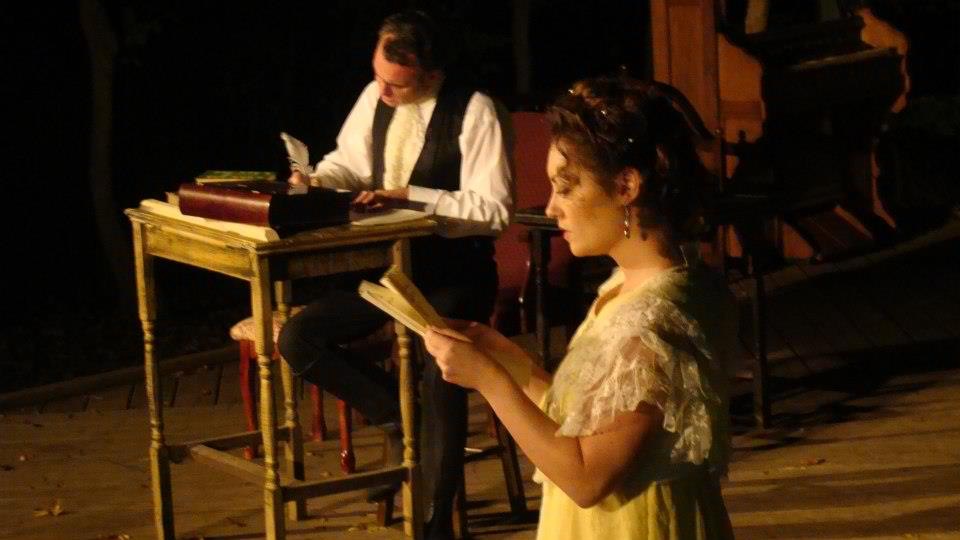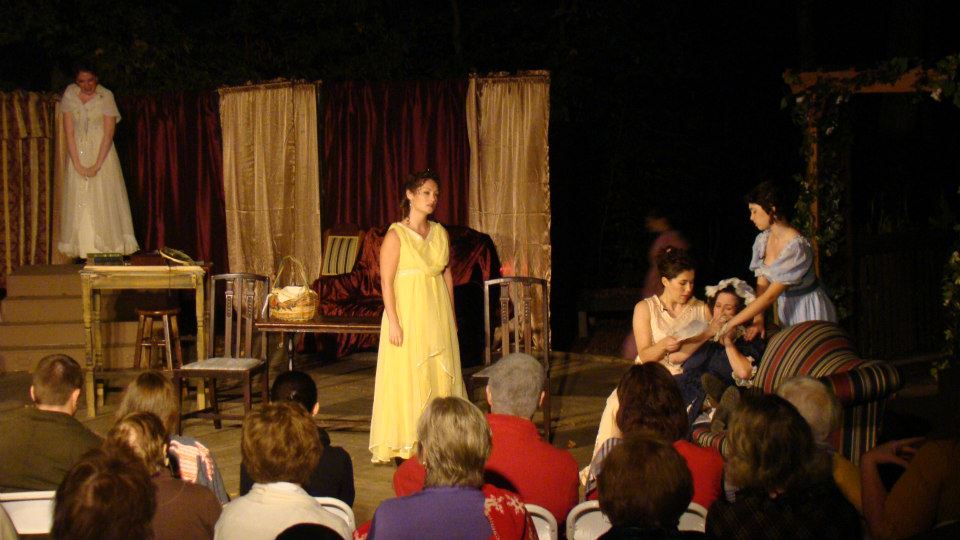"King Lear" in Finlay Park - a review by Jillian Owens
The South Carolina Shakespeare Company opens their fall season with King Lear, one of Shakespeare’s best-known tragedies. George Bernard Shaw once said "No man will ever write a better tragedy than Lear,” and one can definitely see where he’s coming from. Madness, betrayal, suffering, war, and death are all over this play, and the body count is nothing short of impressive.

The elderly King Lear (Chris Cook) is ready for retirement. He plans to divide his kingdom among his three daughters, Goneril (Raia Hirsch), Regan (Sara Blanks), and Cordelia (Katie Mixon.) But there’s a catch: the largest quantity of land will go to the daughter who can prove she loves him most. Goneril and Regan are perfectly happy to deliver speeches of loyalty and devotion that drip with aspartame. But Cordelia remains stoic, saying she has nothing to compare her love to. Her frankness leads to her father disowning her and splitting his lands between Regan and Goneril. The King of France, impressed with her honesty offers to marry her:
“Fairest Cordelia, that art most rich, being poor; most choice, forsaken; and most lov'd, despis'd! Thee and thy virtues here I seize upon. Be it lawful I take up what's cast away.”
And they hop off to France.
Lear quickly learns how fickle filial loyalty can be. As soon as he relinquishes his power, he loses all respect from both of his daughters. They chide him for being raucous, and force him to let the majority of his entourage go. This shocking fall from power and dignity leads Lear to become more and more insane as the play progresses. The former King quickly learns that his only true friends are his now-disguised former pal Kent (Tracy Steele) whom he banished for defending Cordelia, and his Fool (played by Jeff Driggers.)
Intermingled in this main plot is further drama with a troublemaking illegitimate son by the name of Edmund (Bobby Bloom) to the Earl of Gloucester (Richard Purday.) He tricks Gloucester - way too easily - into thinking his legitimate son Edgar (William Cavitt) plans to steal his estate. Eyeballs are removed, women are seduced, and lots of folks die in some pretty creative ways.
In this production of Lear, director Linda Khoury has assembled a large cast with varying skill levels and a curious array of accents. Cook is a vulnerable and powerful Lear, and he captures his descent into madness with an intensity that evokes sympathy. Hirsh and Blanks are appropriately evil as Goneril and Regan, and Mixon makes for a wonderful contrast as the honest and sincere Cordelia. Edmund gets some of the best lines in the play, and Bloom delivers them with acerbic intensity:
“Wherefore should I stand in the plague of custom, and permit the curiosity of nations to deprive me, for that I am some twelve or fourteen moonshines lag of a brother? Why bastard? wherefore base?”
Driggers plays the Fool (see what I did there?) not so much as a clown, but as a terrified young man who grasps the gravity of a dangerous situation from which he must save his friend. There’s an urgency about this Fool that is an unexpected take on the character. Cavitt delivers one of the most challenging and high-energy performances in the play as the selfless, though hopelessly naive, Edgar.
A few members of the ensemble couldn’t quite pick an accent - which was distracting - but as I said before, this is a large cast and every actor’s performance can’t always be golden. At the preview performance I attended, there was a moment of nudity that I’m not altogether sure was simply a wardrobe malfunction. I can’t imagine bringing small children to something as heavy as a Shakespearean tragedy, however, so this might not be an issue for you. The key players do interesting work, and the SC Shakespeare Company takes a straightforward interpretation of King Lear to a few surprisingly creative places.
~ Jillian Owens
King Lear runs Wednesday, October 22 through Saturday, October 25 in the Amphitheatre in Finlay Park. Curtain is at 7:30 PM, and the Wednesday performance is free! For more information, visit http://www.shakespearesc.org/ .
Sunday in the Park with Jane (& other Quirky Manners of the Landed Gentry) - Arik Bjorn reviews "Pride & Prejudice"
Though American society seems to have disposed itself entirely of formal introductions, carefully-constructed speech, and scripted courtships, we remain obsessed with British mannerisms. As if popular shows like Downton Abbey and all of the other series tossed to us across the pond via Masterpiece Theatre were not evidence enough, there seems to be a revival of 19th-century British literature, as theatre. Every week one sees a new Hollywood film, miniseries, television show, and even detective series inspired by the works of the Bronte Sisters, Jane Austen, George Eliot and the like. South Carolina Shakespeare Company Artistic Director Linda Khoury agrees: “We are Anglophiles at heart. And there’s this Jane Austen fever at the moment. When we asked Company members about whether or not to do Pride & Prejudice this season, they said, ‘Oh my God, Mr. Darcy! Yes!’”
The works of Jane Austen seem to be everyone’s current favorite landed-gentry flavor; the stage adaptation of Pride & Prejudice by playwright and former Actors Theatre of Louisville Artistic Director Jon Jory has been staged by a number of classical theatre companies across the country in recent years. At first, this fact might seem incongruous: why would classical theatres be attracted to a story seemingly imprisoned within a 19th-century manor and its well-groomed grounds? Yet when one rolls an Austen novel onto the stage, what one finds is something closely resembling Shakespeare’s romantic comedies—only refreshingly absent multiple pairs of separated twins wandering about Asia Minor looking for one another.
In fact, halfway through the SC Shakespeare Company’s production of Pride & Prejudice, the thought occurred to me that the pompous clergyman Mr. Collins—played with impeccable comedic timing by veteran Columbia actor George Spelvin—was just one pair of yellow stockings and crossed garters short of a Malvolio. This is the kind of character determination one gets from “seeing” an Austen novel rather than reading it. The same is true with a number of other characters; for instance, Elizabeth Bennet, the axis upon which the tale’s many love stories turn, and with whom theatre patrons are likely to fall for thanks to a wonderful performance by the lovely Katie Mixon, is really just a slightly less histrionic, though equally stubborn, version of Shakespeare’s Beatrice.
Of course, one gets a bit more black box production value with a show in the park. There are no panorama shots of the Hertfordshire countryside, nor horse-drawn carriages—although I will admit that watching local thespian hoot Clark Wallace as Mr. Gardiner pretend to guide an imaginary carriage horse is, at times, far more entertaining than anything BBC could deliver. And one never knows what surprises lay in store for a live show at Finlay Park—from remote-control airplanes making cameo appearances to gospel choirs suddenly breaking into jubilant song across the way, to a pair of hobo wayfarers wandering across the stage. Then again, one might also behold the serendipitous timing of a local church bell ringing just as Mr. Bingley steals a kiss from Elizabeth’s sister, Jane.
Sometimes in set design, simplicity says everything, and one must applaud set designer Lee Shepherd for presenting the Britain of two centuries ago with two principal pieces: a pair of monumental lattice windows through which we metaphorically peak into the lives of the Bennet family, and a pair of matching staircases to represent their leisurely, gentlemanly and gentlewomanly lives. Yet nothing is simple about the period costume work of Alexis Doctor (profiled in the Jasper 006 cover story) ; she provides sumptuous costumes which help the actors and patrons alike fall backward naturally in time.
The story of Pride & Prejudice is well-known; however, if there is a gap in your knowledge of world literature, simply know that Mr. & Mrs. Bennet of Meryton, Hertfordshire, near London, have five daughters of marrying age, whom must wend their way through the labyrinth of British customs and breeding to find satisfactory mates—and do whatever it takes to avoid marrying Clergyman Collins.
There are many fine performances in the production in addition to the work of Spelvin and Mixon. Every Austen story needs its somewhat feather-headed parents: Alfred Kern delivers a delightful performance as Mr. Bennet, played perfectly like Jim Broadbent on Prozac; and Ruth Glowacki as Mrs. Bennet keeps the audience tittering with her “a’ plenty palpitations.” All of the Bennet daughters are well cast to their respective personalities, but one especially delights in the ‘poo-poo’ naughtiness of the scandalous youngest daughter, Lydia, played by Sirena Dib. Sting lookalike Tracy Steele provides a complex portrayal of the strong-yet-meek Mr. Bingley, and Sara Blanks plays his strident, gossiping sister, Caroline Bingley, with equal solidity. And Mrs. Gardiner is played by local attorney Raia Hirsch, who returns to the stage after many years, having not skipped a theatrical beat.
Last but not least, one must present a standing ovation to Company Stage Manager, Paula Peterson, whose work and dedication to the Shakespeare Company, as well as to many other Columbia community and professional theatre productions over the years, deserves accolades and recognition. One simply cannot understand the mind-bending machinations required to stage a live production out-of-doors—let alone a show where the backstage is actually an island with a watery moat.
The SC Shakespeare Company recently participated in Cheer from Chawton, a one-woman show about the life of Jane Austen that was performed at USC’s Drayton Hall in September. In the show, one learns that Austen’s own childhood was spent entertaining her family with “little theatricals,” so perhaps the great author herself would delight in seeing her two-century-old popular tale brought to life on stage.
As director Khoury explains, it makes sense for the Shakespeare Company to do just so for a fellow British storyteller: “Austen is a complement to the Bard. They both distill everything through characterization. And, of course, Austen has that certain sense and sensibility.”
~ Arik Bjorn
Pride & Prejudice runs throughout October in the Finlay Park Amphitheatre with performances on October 17-20 and October 24-27 at 7:30 p.m. Performances are free! If you would like to reserve group seating, plus call: 803.787.BARD. Finlay Park is located in downtown Columbia, on the block bounded by Assembly Street, Laurel Street, Gadsden Street, and Taylor Street, behind the main post office. (The amphitheater is on the Laurel Street side.) To learn more about the South Carolina Shakespeare Company, visit www.shakespearesc.org or visit the Company’s Facebook page.







